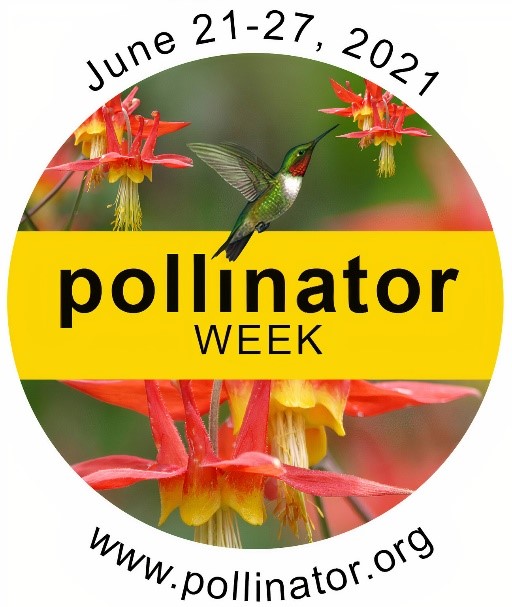June 21 to June 27, 2021 is Pollinator Week!
When we think of pollinators, perhaps many of us first think of the honeybee. Honeybees have a reputation of hard work and are associated with symbolism of industry, community and abundance — images that reflect the agricultural community as well. Because of the astonishing migration of managed honeybee colonies to California in the winter months, many Californians know just how important honeybees are to food production. Studies estimate that honeybee pollination contributes several billion dollars in agricultural productivity throughout the United States each year.
In addition to honeybees, many other animals perform the necessary job of pollinating plants. Insects including flies, wasps, bees, beetles and butterflies are pollinators. So are birds, bats and other mammals. With their combined impact, one in three bites of food are a result of pollinators.
Habitat loss, climate change, pesticide exposure, and other factors negatively impact pollinators. Recent news articles indicate that monarch butterfly populations have declined 99% in the last three decades — a truly astounding loss.
CDFA supports pollinators
CDFA is engaging with many partners to support and protect pollinators. In one effort, CDFA, agricultural and environmental partners have joined to form the California Pollinator Coalition to identify strategies to increase habitat for pollinators and improve pollinator health. Here are a few of the other efforts CDFA is taking to support pollinators:
- CDFA’s Plant Health Division hosts a Pollinator Protection website with resources for landowners and apiaries.
- The Bee Safe Program helps protect managed honeybees from theft, disease and pesticide exposure.
- Through the most recent funding round of the Healthy Soils Program (HSP), CDFA’s Office of Environmental Farming and Innovation supported planting of over 7,000 acres of pollinator habitat on 129 projects throughout California. The practices identified as having pollinator benefits include cover cropping, field borders, hedgerow planting, riparian herbaceous cover, and others.
- CDFA’s Office of Pesticide Consultation and Analysis has revitalized a research program, the Biologically Integrated Farming Systems Program (BIFS) to provide outreach of innovative, biologically integrated plant-based farming systems that reduce chemical insecticide inputs.
As California ramps up efforts to protect its unique and precious biodiversity, CDFA will be working closely with partner agencies to find and implement further actions that support pollinator health.
In honor of Pollinator Week, consider planting native plant species with pollinator benefits on your farm or garden landscape, evaluate your integrated pest management strategy in light of pollinator population declines, and take a moment to ponder the essential and amazing relationship that we have with pollinators.





Pingback: New Study Shows Pesticides’ Harmful Impacts on Soil Organisms - CalCAN